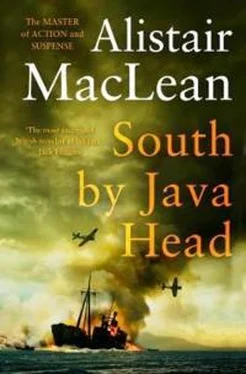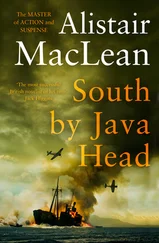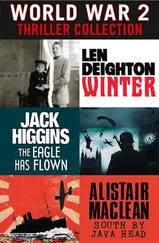It was, as ever, McKinnon that had seen it first, a long, low shape through a distant gap in the rain-squalls, just over two miles away. They had no reason to fear anything but the worst, the inevitable worst, and it had taken only seconds to lower the tattered lug and jib, knock the pin from the mast clamp, unship the mast itself and cower down in the bottom of the boat, so that it had become, even from a short distance, no more than an empty, drifting lifeboat, difficult to see in the mists of driving rain, possibly not worth investigating even if it had been seen. But they had been seen, the long grey shape had altered course to intercept their line of drift, and now they could only thank God that it had altered its course, bless the sharp-eyed lookouts who had impossibly picked out their little grey boat against its vast grey background.
It was Nicolson who had at first incredulously identified it, then Findhorn, McKinnon, Vannier, Evans and Walters had all recognised it too. This was not the first time they had seen one of them, and there could be no possible doubt about it. It was a U.S. Navy Torpedo Boat, and their torpedo boats couldn’t be confused with anything afloat. The long, sweeping flare of the bows, the seventy-foot plywood shell driven by its three high-speed marine motors, its quadruple torpedo tubes and .50 calibre machine-guns were quite unmistakable.
It was flying no flag at all, but, almost as if to remove any last doubts they might have about its nationality, a seaman aboard the torpedo boat broke out a large flag that streamed out stiffly in the wind of its passing: it was approaching at a speed of something better than thirty knots – nowhere near its maximum – and the white water was piled high at its bows. Even in the gathering gloom there was no more mistaking the flag than there was the torpedo boat: the Stars and Stripes is probably the most easily identifiable flag of all.
They were all sitting up in the lifeboat now, and one or two were standing, waving at the M.T.B, A couple of men on the M.T.B. waved back, one from the wheelhouse, the other standing by one of the for’ard turrets. Aboard the lifeboat, people were gathering their few pitiful possessions together, preparatory to boarding the American vessel, and Miss Plenderleith was in the act of skewering her hat more firmly on to her head when the M.T.B. abruptly slowed down her big Packard motors, jammed them into reverse and came sliding smoothly alongside, only feet away, dwarfing the little lifeboat. Even before she stopped completely, a couple of heaving lines came sailing across the gap of water and smacked accurately fore and aft into the lifeboat. The co-ordinated precision, the handling of the boat clearly bespoke a highly-trained crew. And then both boats were rubbing alongside, Nicolson had his hand on the M.T.B.’s side, the other raised in greeting to the short, rather stocky figure that had just appeared from behind the wheelhouse.
“Hallo there!” Nicolson grinned widely, and stretched out a hand in greeting. “Brother, are we glad to see you!”
“Not half as glad as we are to see you.” There was a gleam of white teeth in a sunburnt face, an almost imperceptible movement of the left hand, and the three sailors on deck were no longer interested bystanders but very alert, very attentive guards, with suddenly produced sub-machine-guns rock-steady in their hands. A pistol, too, had appeared in the speaker’s right hand. “I fear, however, that your rejoicing may prove to be rather shorter-lived than ours. Please to keep very still indeed.”
Nicolson felt as if he had been kicked in the stomach. With a queer sort of detachment he saw that his hand was no longer resting loosely against the ship’s side but was bar-taut, each separate tendon standing out rigidly from the back of his hand. In spite of all the water he had drunk, his mouth felt suddenly as dry as a kiln. But he managed to keep his voice steady enough.
“What kind of bad joke is this?”
“I agree.” The other bowed slightly, and for the first time Nicolson could see the unmistakable slant, the tight-stretched skin at the corner of the eyes. “For you it is not funny at all. Look.” He gestured with his free hand, and Nicolson looked.
The Stars and Stripes was already gone and, even as he watched, the Rising Sun of Japan fluttered up and took its place.
“A regrettable stratagem, is it not?” the man continued. He seemed to be enjoying himself thoroughly. “As is also the boat and, alas, the passably Anglo-Saxon appearance of my men and myself. Though specially chosen on account of this last, I can assure you we are not especially proud of it. All that, however, is by the way.” His English was perfect, with a pronounced American accent, and he obviously took pleasure in airing it. “There has been much sunshine and storm in the past week. It is most considerate of you to have survived it all. We have been waiting a long time for you. You are very welcome.”
He stopped suddenly, teeth bared, and lined up his pistol on the brigadier, who had spiling to his feet with a speed astonishing in a man of his years, an empty whisky bottle swinging in his hands. The Japanese officer’s finger tightened involuntarily on the trigger, then slowly relaxed when he saw that the bottle had been intended not for him but for Van Effen, who had half-turned as he had sensed the approaching blow, but raised his arm too late. The heavy bottle caught him just above the ear and he collapsed over his thwart as if he had been shot.
The Japanese officer stared at Farnholme.
“One more such move and you will die, old man. Are you mad?”
“No, but this man was, and we would all have died. He was reaching for a gun.”
Farnholme stared down angrily at the fallen man. “I have come too far to die like this, with three machine-guns lined on me.”
“You are a wise old man,” the officer purred. “Indeed, there is nothing you can do.”
There was nothing they could do, Nicolson realised helplessly, nothing whatsoever. He was conscious of an overwhelming bitterness, a bitterness that he could taste in his mouth. That they should have come so far, that they should have overcome so much, overcome it impossibly and at the expense of five lives, and then that it should all come to this. He heard the murmur of Peter’s voice behind him and when he turned round the little boy was standing up in the sternsheets, looking at the Japanese officer through the lattice screen of his crossed fingers, not particularly afraid, just shy and wondering, and again Nicolson felt the bitterness and the angry despair flood over him almost like a physical tide. Defeat one could accept, but Peter’s presence made defeat intolerable.
The two nurses were sitting one on either side of him, Lena’s dark, sooty eyes wide with terror, Gudrun’s blue ones with a sadness and despair that all too accurately reflected his own feelings. He could see no fear in her face, but high on the temple, where the scar ran into the hairline, he could see a pulse beating very quickly. Slowly, involuntarily, Nicolson’s gaze travelled all round the boat, and everywhere the expressions were the same, the fear, the despair, the stunned and heart-sickening defeat. Not quite everywhere. Siran’s face was expressionless as ever. McKinnon’s eyes were flickering from side to side as he looked swiftly over the lifeboat, up at the M.T.B. and then down into the lifeboat again – gauging, Nicolson guessed, their suicidal chances of resistance. And the brigadier seemed almost unnaturally unconcerned: his arm round Miss Plenderleith’s thin shoulders, he was whispering something in her ear.
“A touching and pathetic scene, is it not?” The Japanese officer shook his head in mock sorrow. “Alas, gentlemen, alas for the frailty of human hopes. I look upon you and I am almost overcome myself. Almost, I said, but not quite. Further, it is about to rain, and rain heavily.” He looked at the heavy bank of cloud bearing down from the north-east, at the thick curtain of rain, now less than half a mile away, sweeping across the darkening sea. “I have a rooted objection to being soaked by rain, especially when it is quite unnecessary. I suggest, therefore–”
Читать дальше
Конец ознакомительного отрывка
Купить книгу










